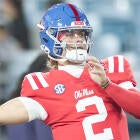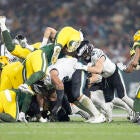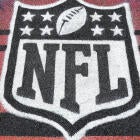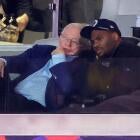Gary Barnidge welcomed David Njoku to the Browns after the team traded back into the first round of the 2017 NFL Draft to select the University of Miami product. A day later, the Browns informed Barnidge his services were no longer needed in Cleveland because of Njoku and released the veteran tight end.
The result isn't usually as extreme as Barnidge's case, but the arrival of young talent through the draft can alter the career trajectory of veteran players already on a team. Tenures with teams can be shortened in situations where roster spots aren't immediately put in jeopardy. Starters can suddenly become backups or forced to compete to be in the lineup. Some players wanting contract extensions can be required to play out contracts and test free agency. Here's a look at 12 veterans put on notice because of the draft.
Glennon took a three-year, $45 million contract from the Bears in free agency expecting to have at least one season to prove he's the answer at quarterback. The Bears making a surprising trade to move up one spot in the draft to select Mitchell Trubisky at No. 2 overall means Glennon is a stopgap, at best. Glennon reportedly felt cheated on with the pick. He'll likely need to have a strong start to the season resulting in victories to keep Trubisky on the bench.
The Bears can get out of Glennon's contract in 2018 after paying him between $16 million and $18.5 million for one year of service. In addition to his $16 million salary this year, Glennon has a fully guaranteed $2.5 million roster bonus that's payable early next March on the third day of the 2018 league year. This roster bonus voids if Glennon earns a $2.5 million incentive this season for either the Bears winning nine games while his offensive playtime is at least 60 percent or for him ranking in the top 10 in the NFL in passer rating (minimum of 224 pass attempts) while taking at 60 percent of Chicago's offensive snaps. Since the 2018 guarantee has an offset, the Bears could recoup the entire $2.5 million by releasing Glennon before the bonus is due and he makes at least that amount next year from another team.

Savage had to be relieved when Tony Romo decided to become a broadcaster. The Texans were the preferred destination of the former Cowboys signal caller if he had continued playing football. After the Texans gave up next year's first-round pick to move from 25th overall to this year's 12th pick for Deshaun Watson, head coach Bill O'Brien and general manager Rick Smith quickly endorsed Savage, whose rookie contract expires after the season, as the starting quarterback. It only took Smith a few days to reverse course, stating that Watson would get an opportunity to compete for the quarterback spot.
Savage's knowledge of O'Brien offense from his three years in the system should give him an advantage over Watson to be the opening day starter. Even if Savage remains under center all season, he'll likely need for the Texans to make a deep playoff run while playing at a Pro Bowl level to return in 2018 unless he's willing to accept backup quarterback money.
Murray had big shoes to fill when he signed a three-year, $15 million contract (worth as much as $25.9 million through base salary escalators and incentives) to be Adrian Peterson's successor. He faces stiff competition from second round pick Dalvin Cook, whose character concerns prevented him from going in the first round.
Splitting carries or backing up Cook will be costly for Murray. He makes $500,000 in incentives by rushing for 900 yards in 2017. The amount earned increases by $250,000 for every additional 100 rushing yards up to 1,500 yards for a maximum of $2 million. The same amount earned gets added to Murray's base salary in the following year. Murray's contract could turn into a one-year deal for $4.25 million if Cook quickly emerges. Murray is scheduled to make $5.75 million in 2018. There is $1.1 million of Murray's $5.15 million 2018 base salary that is currently guaranteed for injury. This $5.15 million becomes fully guaranteed early next March on the third day of the 2018 league year.
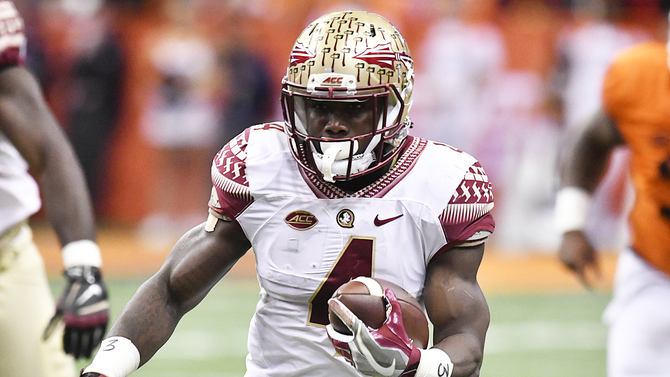
The Bills were hesitant about picking up Watkins' fifth option year in 2018 worth $13.258 million because of his injury history. Watson is recovering from his second surgery to repair the broken left foot that limited him to eight games last season. Selecting Zay Jones early in the second round allowed the Bills to decline the option. Watkins could make the Bills regret their option decision by having a career year while staying healthy. This might bring a franchise tag, which should be more than $16 million in 2018, into play next offseason. However, another injury-plagued or disappointing season could prompt Watkins to go the one-year prove it deal route like Terrelle Pryor and Alshon Jeffery.
Hill looked like a feature back in the making during his rookie season in 2014. He was second in the NFL in rushing during the second half of the season with 775 yards. Hill's 5.1 yards per carry was third among NFL running backs in 2014. He followed up his promising rookie campaign with two subpar seasons in which he also led the Bengals in rushing.

Hill may not get a chance at redemption in his contract year because Joe Mixon, who was taken in the second round of this year's draft with the 48th overall pick, could take a fair amount of carries from him. Mixon may have been the most talented running back available but slipped in the draft due to a 2014 incident in which he punched a female Oklahoma student in the face. Mixon's presence likely ends any chance of a contract extension. Fellow backfield mate Giovani Bernard received a three-year, $15.5 million extension last June when he was entering the final year of his rookie deal.
Although Smith rebounded from a benching in his Raiders debut in the 2016 regular season opener against the Saints, he wasn't quite what the Raiders expected when they lured him away from the AFC West rival Chiefs with a four-year, $38 million contract in free agency last year. Oakland ranked 24th against the pass last season, allowing 257.5 yards per game. The Raiders tied for 20th with 27 touchdowns given up through the air partially because of Smith's inconsistency.
This prompted Oakland to use its first-round pick on cornerback Gareon Conley, who is facing rape allegations. The Raiders can easily move on from Smith, who turns 30 in July, in 2018 if he doesn't have a better 2017 season or Conley is cleared. Cutting Smith would clear $8.5 million of salary cap room. There wouldn't be any dead money, which is a salary cap charge for a player no longer on the roster, because of Oakland giving Smith a "pay as you go" contract where his cap number and cash are the same each year.
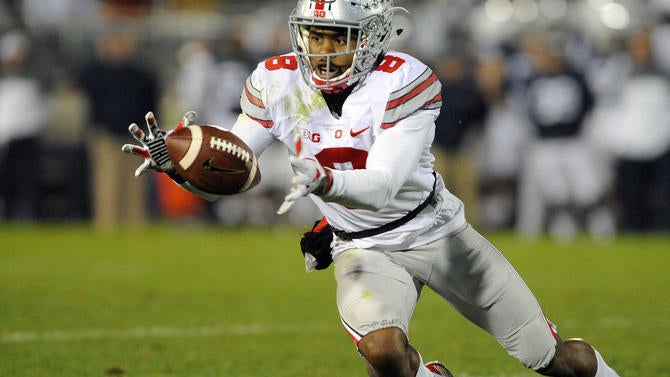
Chancellor may never get the contract he wanted from the Seahawks when he staged a holdout in 2015 that lasted through the second game of the season because he was unhappy with the four-year, $28 million extension he signed in 2013. That deal, which runs through the 2017 season, made Chancellor one of the NFL's highest-paid strong safeties. His eventual replacement may have been found in the third round of the 2017 draft with Delano Hill.
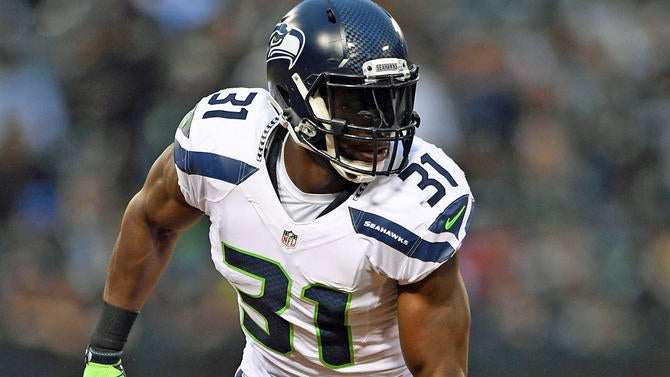
An extension for Chancellor, who is scheduled to make $7.125 million in his contract year, could be too rich for Seattle's blood regardless of Hill because of the way the Dolphins have treated Reshad Jones, who was entering his contract year. Jones signed a four-year, $48 million extension containing $33 million of guarantees in March despite missing the final 10 games of the 2016 season with a shoulder injury requiring surgery. Since Jones signed a similar deal to Chancellor's in 2013, his new contract is likely a salary benchmark for Chancellor.
Patrick Mahomes, the 10th overall pick in the draft, will redshirt in 2017 if every goes according to plan for the Chiefs. The transition from Smith to Mahomes as starting quarterback would likely take place in 2019. Smith's four-year, $68 million extension expires after the 2018 season. A poor 2017 season by either Smith or the Chiefs could accelerate the timetable. The Chiefs could move on from Smith next year when his cap number is $20.6 million with just $3.6 million in dead money.
The Saints signed Adrian Peterson a couple days prior to the draft because he is a good complement to Mark Ingram. Trading next year's second round pick to select Alvin Kamara early in the third round doesn't have the same feel. His skill set overlaps with Ingram's more than Peterson's. The Saints could have a crowded backfield for the next two years since Peterson and Ingram are under contract through the 2018 season. It wouldn't be a surprise if Kamara passes Ingram on the depth chart after this season.

Albert has been a no-show for offseason workouts, which started in April, after being acquired from the Dolphins in a March trade because he wants a new contract. The Jaguars have no intention of giving Albert, who is scheduled to make $8.9 million and $9.6 million in 2017 and 2018, a new deal or releasing him. Albert was acquired to shore up the left tackle spot. He will now be competing with Cam Robinson, who was taken with the 34th overall pick in this year's draft, whenever he shows up. Assuming Robinson would have still been drafted if Albert had been present for the start of workouts, he probably would have been faced with a situation he had last year in Miami. Laremy Tunsil, the Dolphins' 2016 first-round pick, was moved to guard instead of playing his college position, left tackle. Robinson challenging Albert this year rather than playing guard may make it less likely that Albert plays a second year in Jacksonville.
Zach Cunningham, the 57th overall pick who has three-down linebacker potential, instantly improves the Texans' ability to cover tight ends and running backs. That isn't the strong suit of Cushing or Benardrick McKinney. Cunningham is going to affect Cushing, who is under contract through 2019 for $24.75 million, in the long run more than McKinney. Cushing's $8.5 million 2018 salary could be jeopardy when McKinney, a 2015 second pick, becomes eligible for an extension next year. It wouldn't be unreasonable for McKinney to seek more than the $8.75 million per year the Texans gave Cushing in 2013 since the deal will be five years old at that point.
Franklin hasn't lived up to his billing since signing a five-year, $36.5 million contract with $20 million of guarantees as a free agent in 2015. The Chargers using consecutive picks on guards Forrest Lamp and Dan Feeney in the second and third rounds this year doesn't bode well for Franklin in the future. Franklin is making $6.75 million in 2018 on an $8.35 million cap number. $5.15 million of cap room would be gained next year by making a move with Franklin.
![[object Object] Logo](https://sportshub.cbsistatic.com/i/2020/04/22/e9ceb731-8b3f-4c60-98fe-090ab66a2997/screen-shot-2020-04-22-at-11-04-56-am.png)
































